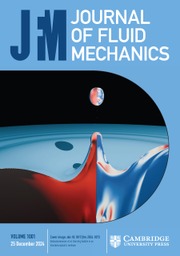Crossref Citations
This article has been cited by the following publications. This list is generated based on data provided by
Crossref.
Kozin, V. M.
and
Pogorelova, A. V.
2009.
Effect of the viscosity properties of ICE on the deflection of an ICE sheet subjected to a moving load.
Journal of Applied Mechanics and Technical Physics,
Vol. 50,
Issue. 3,
p.
484.
BONNEFOY, FÉLICIEN
MEYLAN, MICHAEL H.
and
FERRANT, PIERRE
2009.
Nonlinear higher-order spectral solution for a two-dimensional moving load on ice.
Journal of Fluid Mechanics,
Vol. 621,
Issue. ,
p.
215.
MILEWSKI, PAUL A.
VANDEN-BROECK, J.-M.
and
WANG, ZHAN
2011.
Hydroelastic solitary waves in deep water.
Journal of Fluid Mechanics,
Vol. 679,
Issue. ,
p.
628.
Hosking, Roger J.
and
Milinazzo, Fausto
2012.
Modelling the Floating Ladder Track Response to a Moving Load by an Infinite Bernoulli-Euler Beam on Periodic Flexible Supports.
East Asian Journal on Applied Mathematics,
Vol. 2,
Issue. 4,
p.
285.
Amoushahi, Hossein
and
Azhari, Mojtaba
2013.
Static analysis and buckling of viscoelastic plates by a fully discretized nonlinear finite strip method using bubble functions.
Composite Structures,
Vol. 100,
Issue. ,
p.
205.
Amoushahi, Hossein
Azhari, Mojtaba
and
Heidarpour, Amin
2015.
A Fully Discretized Nonlinear Finite Strip Formulation for Pre-Buckling and Buckling Analyses of Viscoelastic Plates Subjected to Time-Dependent Loading.
Mechanics of Advanced Materials and Structures,
Vol. 22,
Issue. 8,
p.
655.
van der Sanden, J.J.
and
Short, N.H.
2017.
Radar satellites measure ice cover displacements induced by moving vehicles.
Cold Regions Science and Technology,
Vol. 133,
Issue. ,
p.
56.
Hu, M.-Y.
and
Zhang, Zh.-H.
2017.
Displacement response analysis of a floating ice plate under a triangular pulse load.
Journal of Applied Mechanics and Technical Physics,
Vol. 58,
Issue. 4,
p.
710.
Li, Ji-suo
and
Dong-qiang, Lu
2017.
Flexural-gravity wave resistances due to a moving point source on 2-D infinite floating beam.
Journal of Hydrodynamics,
Vol. 29,
Issue. 6,
p.
1000.
Kozin, V. M.
Zemlyak, V. L.
and
Rogozhnikova, E. G.
2017.
Increasing the efficiency of the resonance method for breaking an ice cover with simultaneous movement of two air cushion vehicles.
Journal of Applied Mechanics and Technical Physics,
Vol. 58,
Issue. 2,
p.
349.
Dinvay, E.
Kalisch, H.
and
Părău, E. I.
2019.
Fully dispersive models for moving loads on ice sheets.
Journal of Fluid Mechanics,
Vol. 876,
Issue. ,
p.
122.
Meylan, Michael H.
2019.
The time-dependent vibration of forced floating elastic plates by eigenfunction matching in two and three dimensions.
Wave Motion,
Vol. 88,
Issue. ,
p.
21.
Kozin, V.
2020.
Увеличение ледоразрушающей способности изгибно-гравитационных волн при их приближении к берегу.
Вестник Инженерной школы ДВФУ,
Vol. 44,
Issue. 3,
p.
37.
Zemlyak, V L
Rogozhnikova, E G
Vasilyev, A S
and
Radionov, S V
2020.
The research of the effectiveness of the ice cover destruction by the resonance method from the pair motion of the load.
Journal of Physics: Conference Series,
Vol. 1459,
Issue. 1,
p.
012002.
Meylan, Michael H.
2021.
Time-Dependent Motion of a Floating Circular Elastic Plate.
Fluids,
Vol. 6,
Issue. 1,
p.
29.
Sturova, I. V.
2021.
Motion of a Load over an Ice Sheet with Non-Uniform Compression.
Fluid Dynamics,
Vol. 56,
Issue. 4,
p.
503.
Romeyn, Rowan
Hanssen, Alfred
Ruud, Bent Ole
and
Johansen, Tor Arne
2021.
Sea ice thickness from air-coupled flexural waves.
The Cryosphere,
Vol. 15,
Issue. 6,
p.
2939.
Hosking, Roger J.
and
Milinazzo, Fausto
2022.
Two-dimensional response of a floating ice plate to a line load moving at variable speed.
Journal of Fluid Mechanics,
Vol. 938,
Issue. ,
Dinvay, Evgueni
Kalisch, Henrik
and
Părău, Emilian
2022.
Waves generated by moving loads on ice plates: Viscoelastic approximations.
Wave Motion,
Vol. 114,
Issue. ,
p.
103011.
Johnsen, Kristoffer
Kalisch, Henrik
and
Părău, Emilian I.
2022.
Ship wave patterns on floating ice sheets.
Scientific Reports,
Vol. 12,
Issue. 1,


